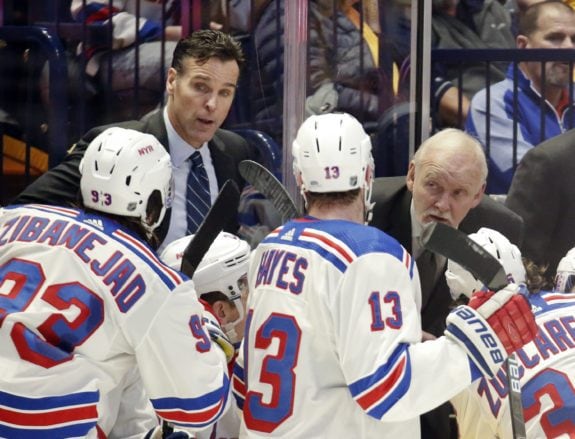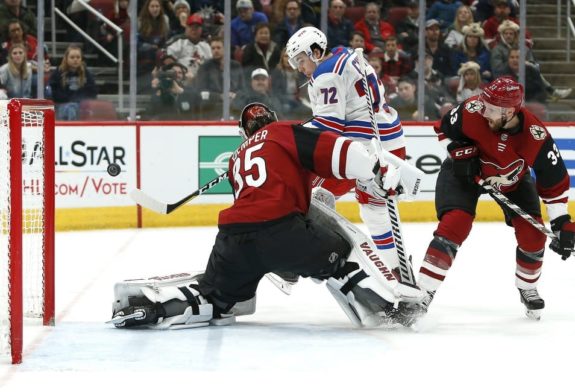![]()
What started as a fairly strong start for the New York Rangers in the 2018-19 season has seemed to dwindle in the first games of the new year. While the team was not on-pace to reach the playoffs, they picked up big wins against the Nashville Predators and St. Louis Blues to end 2018, and had been playing better than expected with a young and developing roster.
That quickly changed as 2019 began, as the Rangers have gone 0-5 and have not picked up a single point. In those five losses, three were by a deficit of five or more goals, signifying not only a loss, but an extremely poor performance by the team as a whole.
While certain parts of the Rangers’ play are to blame for the recent struggle, including goaltending, increased penalties and poor defensive play, the over-arching problem that is affecting all of these parts is the length of the season. With such a young team playing night in and night out, the Rangers are feeling the effects of the long season.
Adjustment to NHL, Including Season Length
It is no secret that rookies and younger players in their first season in the NHL need an adjustment period. In fact, this is why most rookies will split time between the NHL team and their AHL affiliate as this allows them to gradually adjust to the game’s speed and style, and to that player’s position, role and presence on the ice.
Very rarely does a player come from their collegiate or major junior team and immediately make a full adjustment to the new league. Players along the likes of Sidney Crosby and Connor McDavid, yes, but no one that is currently wearing a Rangers jersey is on that level.

The 82-game season in the NHL is the longest in professional hockey. Whether players come from the NCAA, KHL or the junior leagues, none will have played a season that consisted of 82 games.
Even more noteworthy is that most of these leagues maintain the same time frame as the NHL, with some extending longer, like the KHL which stretches from August to April. Therefore, the pace and frequency of games in the NHL are unmatched by any other league, making it near impossible for players to prepare for the rigorous demands expected by their respective clubs.
Fatigue Is No Match Against Experienced, Aged Talent
It should come as no surprise that the length and rigor of a season is an incredibly important part of a player’s development and growth in the NHL. They can also be used to explain the difficulties plaguing the Rangers in the first two weeks of 2019. With younger players still adjusting, fatigue becomes expected, and this has a direct impact on performance.

In fact, I attribute the blowouts the Rangers suffered last week to this fatigue. When facing older, aged teams with less ongoing development, like the Pittsburgh Penguins and Colorado Avalanche, the Rangers’ young legs simply cannot keep up with the faster, stronger and more experienced players. This lack of play, in turn, has an effect on Henrik Lundqvist, as he cannot handle the doubled increase of pressure he has been faced with, which is reflected in his three-game streak of giving up five-plus goals per game.
Only Solution is to Push Through the Adjustment
Although the situation remains unpleasant for Rangers fans and the organization alike, the saving grace rests in the inability to control this process. Adjusting to the league is a part of the playing in the NHL and it is why teams spend a lot of resources on the development of the organization’s players. Therefore, Rangers fans should find relief in the fact that this process is inevitable. It was going to happen, as it does to every rebuilding team, and once the adjustments are complete, it should not happen again for some time.
Moreover, to be even more optimistic about this situation, fans should realize that this is a part of the many growing pains discussed when Rangers GM Jeff Gorton announced last spring that the organization would be focusing on rebuilding efforts. The Rangers were not expected to dominate the Metropolitan Division, and making the playoffs was viewed as an extra positive if they were able to squeeze into the top-eight in the Eastern Conference.
It’s All Uphill from Here
Although it is difficult to go through the tough transition phase from a consistent playoff team to one that is focusing on development, not Stanley Cups, this was the reason for Gorton’s announcement last season. The Rangers knew this was coming, and therefore it is not necessary to dwell on what is happening, as this was expected. What is important is how well the Rangers respond and continue to develop into a team that will be competing for a Cup in five years time.